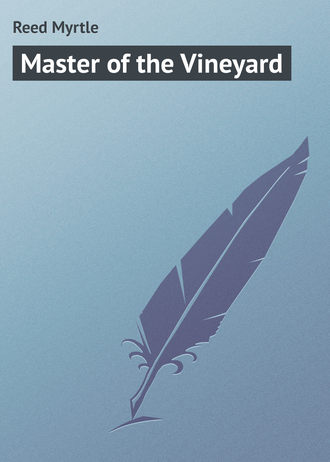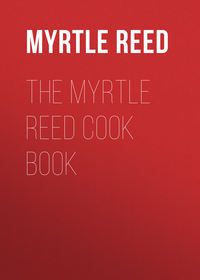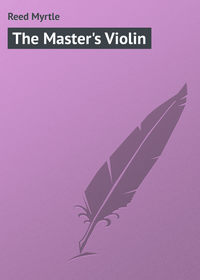 полная версия
полная версияMaster of the Vineyard
Warm tides of assurance and love flowed through her heart, cleansing, strengthening, sweeping barriers aside in a mighty rush of joy. What barriers could earth interpose, when two belonged to each other in such heavenly ways as this? Step by step her soul mounted upward to the heights, keeping pace with another, in the room beyond.
Edith's RevelationOut of sound and sight and touch, with darkened spaces and closed doors between, they two faced the world together as surely as though they were hand in hand. Even Death could make no difference – need Life deny them more?
Then, with a blinding flash of insight, the revelation came to her – there was no denial, since they loved. Sense, indeed, was wholly put aside, but love has nothing to do with sense, being wholly of the soul. Shaken with wonder, she trembled as she sat in her chair, staring out into the starless night.
No denial! All that Love might give was theirs, not only for the moment but for all the years to come. Love – neither hunger nor thirst nor passion nor the need of sleep; neither a perception of the senses nor a physical demand, yet streaming divinely through any or all of these as only light may stream – the heavenly signal of a star to earth, through infinite darkness, illimitable space.
By tortuous paths and devious passages, she had come out upon the heights, into the clear upper air of freedom and of love. Exquisitely, through the love of the one had come the love of the many; the complete mastery of self had been gained by the surrender of self; triumph had rewarded sacrifice.
Her Understanding of LoveNothing was difficult now – nothing would ever be hard again. To go where she was wanted, to give what she could that was needed, steadily to set self aside, asking for nothing but the opportunity to help, and through this high human service renewing the spent forces of her soul at the divine fountains that do not fail – this, indeed, was Love!
Oh, to make the others understand as she understood now – and as Alden understood! In her thought they two were as one. Groping through the same darkness, he had emerged, with her, into the same light; she felt it through the living, throbbing night more certainly than if they stood face to face in the blinding glare of the sun.
The heart-breaking tragedy of Woman revealed itself wholly to her for the first time. Less materialistic and more finely-grained than Man, she aspires toward things that are often out of his reach. Failing in her aspiration, confused by the effort to distinguish the false from the true, she blindly clutches at the counterfeit and so loses the genuine forever.
Longing, from the day of her birth for Love, she spends herself prodigally in the endless effort to find it, little guessing, sometimes, that it is not the most obvious thing Man has to offer. With colour and scent and silken sheen, she makes a lure of her body; with cunning artifice she makes temptation of her hands and face and weaves it with her hair. She flatters, pleads, cajoles; denies only that she may yield, sets free in order to summon back, and calls, so that when he has answered she may preserve a mystifying silence.
Her Estimate of WomenShe affects a thousand arts that in her heart she despises, pretends to housewifery that she hates, forces herself to play tunes though she has no gift for music, and chatters glibly of independence when she has none at all.
In making herself "all things to all men," she loses her own individuality, and becomes no more than a harp which any passing hand may strike to quick response. To one man she is a sage, to another an incarnate temptation, to another a sensible, business-like person, to another a frothy bit of frivolity. To one man she is the guardian of his ideals, as Elaine in her high tower kept Launcelot's shield bright for him, to another she is what he very vaguely terms "a good fellow," with a discriminating taste in cigarettes and champagne.
Let Man ask what he will and Woman will give it, praying only that somewhere she will come upon Love. She adapts herself to him as water adapts itself to the shape of the vessel in which it is placed. She dare not assert herself or be herself, lest, in some way, she should lose her tentative grasp upon the counterfeit which largely takes the place of love. If he prefers it, she will expatiate upon her fondness for vaudeville and musical comedy until she herself begins to believe that she likes it. With tears in her eyes and her throat raw, she will choke upon the assertion that she likes the smell of smoke; she will assume passion when his slightest touch makes her shudder and turn cold.
Her Estimate of WomenAnd, most pitiful of all, when blinded by her own senses, she will surrender the last citadel of her womanhood to him who comes a-wooing, undismayed by the weeping women around her whose sacred altars have been profaned and left bare. They may have told her that if it is love, the man will protect her even against himself, but why should she take account of the experience of others? Has not he himself just told her that she is different from all other women? Hugging this sophistry to her breast, and still searching for love, she believes him until the day of realisation dawns upon her – old and broken and bitter-hearted, with scarcely a friend left in the world, and not even the compensating coin thriftily demanded by her sister of the streets.
Under her countless masques and behind her multitudinous phases, lurks the old hunger, the old appeal. Man, too, though more rarely, guessing that the imperishable beauty of the soul is above the fog of sense and not in it, searches hopefully at first, then despairingly, and finally offers the counterfeit to the living Lie who is waiting for it with eager, outstretched hands.
The Clouds BreakStirred to the depths by the pity of it, Edith brushed away a tear or two. She was not at all sleepy, but drew the blanket closer around her, for the night grew chill as the earth swept farther and farther away from the sun. The clouds had begun to drift away, and faintly, through the shadow, glimmered one pale star. Gradually, others came out, then a white and ghostly moon, with a veil of cloud about it, grey, yet iridescent, like mother-of-pearl.
Blown far across the seas of space by a swiftly rising wind, the clouds vanished, and all the starry hosts of heaven marched forth, challenging the earth with javelins of light.
"Starbreak," murmured Edith, "up there and in my soul."
The blue rays of the love-star burned low upon the grey horizon, that star towards which the eyes of women yearn and which women's feet are fain to follow, though, like a will-o'-the-wisp, it leads them through strange and difficult places, and into the quicksands.
Fellowship with the WorldThe body grows slowly, but the soul progresses by leaps and bounds. Through a single hurt or a single joy, the soul of a child may reach man's estate, never to go backward, but always on. And so, through a great love and her own complete comprehension of its meaning, Edith had grown in a night out of herself, into a beautiful fellowship with the whole world.
Strangely uplifted and forever at peace, she rose from her chair. The blanket slipped away from her, and her loosened hair flowed back over her shoulders, catching gleams of starlight as it fell. She stretched out her arms in yearning toward Alden, her husband, Madame – indeed, all the world, having come out of self into service; through the love of one to the love of all.
Then, through the living darkness, came the one clear call: "Mine?"
Unmistakably the answer surged back: "In all the ways of Heaven and for always, I am thine."
XIX
If Love Were All
When the Shadows LengthenThe last of the packing was done, and four trunks stood in the lower hall, waiting for the expressman. Alden had not seen Edith that day, though he had haunted the house since breakfast, waiting and hoping for even a single word.
She had been too busy to come down to luncheon, and had eaten only a little from the tray Madame sent to her room. She was to take the early train in the morning.
The afternoon shadows had begun to lengthen when she came down, almost as white as her fresh linen gown, but diffusing about her some radiance from within that seemed not wholly of earth. He met her at the foot of the stairs, and took her hand in his.
"Edith! I've been longing for you all day!"
"And I for you," she returned, avoiding his eyes.
"Listen, dear. Give me the rest of it, won't you?"
For the Last Time"The rest of what?"
"The little time you have left with us – this afternoon and to-night."
For a moment she hesitated, then looked him full in the face, her eyes mutely questioning his.
"I won't," he said. "I promise you that."
"Then I'll come."
"Out on the river?"
"Yes."
"It's for the last time, Edith," he said, sadly; "the very last time."
"I know," she returned. Her lips quivered a little, but her eyes did not falter. Clear and steadfast they looked far beyond him into the future where he had no part. The golden lights in them seemed signal fires now, summoning him mysteriously onward to some high service, not alien, even though apart from her.
They said no more until they were in the boat, swinging out upon the sunlit river. Then Edith glanced at him, half shyly.
"Wasn't last night wonderful?"
"Wasn't it!" he echoed. "I never understood before."
"Nor I."
She trailed a white hand in the water as they sped up stream. The light touched her hair lovingly, bringing gleams of gold and amber from the depths.
Alden's Silence"Dear," he said, "did you think that, after last night, I could urge you to violate your solemn oath or even to break your word?"
"I hoped not, but I didn't know."
"I see it all clearly now. If more was meant for us to have, more would be right for us to take. Back in the beginning this was meant for you and me – just this, and nothing more."
"How could there be more? Isn't love enough?"
"Surely, but the separation hurts. Never even to see your face or touch your hand again!"
"I know," she said, softly. "I'll want you, too."
A thousand things struggled for utterance, but, true to his word, he remained silent. His whole nature was merged into an imperious demand for her, the cry of the man's soul for the woman who belonged to him by divine right.
"If love were all," she breathed, as though in answer to it, "I'd come."
"If love were all," he repeated. "I wonder why it isn't? What is there on earth aside from this? What more can heaven be than love – without the fear of parting?"
"No more," she replied. "We've lost each other in this life, but there's another life to come."
Whirling Atoms"'Helen's lips are drifting dust,'" he quoted.
"Perhaps not. That which once was Helen may be alive to-day in a thousand different forms. A violet upon a mossy bank, a bough of apple blossoms mirrored in a pool, the blood upon some rust-stained sword, a woman waiting, somewhere, for a lover who does not come."
"And her soul?"
"Drawn back into the Universal soul, to be born anew, in part or all."
"What a pagan you are!"
"Yes," she responded, smiling a little, "I am pagan and heathen and Christian martyr and much else. I am everything that I can understand and nothing that I cannot. Don't you see?"
"Yes, I see, but what are we after all? Only two whirling atoms, blown on winds of Fate. What difference does it make whether we cling together, or are hopelessly sundered, as far apart as the poles?"
"The same difference that it makes to a human body whether its atoms behave or not. You don't want to upset the Universe, do you?"
He laughed, a trifle bitterly. "I don't flatter myself that I could."
"Not you alone, nor I, nor even both together, but we mustn't set a bad example to other atoms. As long as there's a preponderance of right in the world, things are clear, but, shift the balance, and then – "
What Is Right?"What is right?" he demanded, roughly. "Always to do the thing you don't want to do?"
"That depends," she returned, shrugging her shoulders. "It is to do what you think is right, and trust that it may be so."
Alden stopped rowing. He was interested in these vague abstractions. "And," he said, "if a woman thinks it is her duty to murder her husband, and does it, is she doing right?"
"Possibly. I've seen lots of husbands who would make the world better by leaving it, even so – well, abruptly, as you indicate. And the lady you speak of, who, as it were, assists, may merely have drawn a generous part of Lucretia Borgia for her soul-substance, and this portion chanced to assert itself while her husband was in the house and out of temper."
"Don't be flippant, darling. This is our last day together. Let's not play a waltz at an open grave."
The long light lay upon the tranquil waters, and, as a mirror might, the river gave it back a hundred-fold, sending stray gleams into the rushes at the bend in the stream, long arrows of impalpable silver into the far shadows upon the shore, and a transfiguring radiance to Edith's face.
A RainbowWhere the marsh swerved aside to wait until the river passed, the sunlight took a tall, purple-plumed iris, the reflection of the turquoise sky in a shallow pool, a bit of iridescence from a dragon-fly's wing, the shimmering green of blown grasses and a gleam of rising mist to make a fairy-like rainbow that, upon the instant, disappeared.
"Oh!" said Edith. "Did you see?"
"See what, dearest?"
"The rainbow – just for a moment, over the marsh?"
"No, I didn't. Do you expect me to hunt for rainbows while I may look into your face?"
The faint colour came to her cheeks, then receded. "Better go on," she suggested, "if we're to get where we're going before dark."
The oars murmured in the water, then rain dripped from the shining blades. The strong muscles of his body moved in perfect unison as the boat swept out into the sunset glow. Deeper and more exquisite with every passing moment, the light lay lovingly upon the stream, bearing fairy freight of colour and gold to the living waters that sang and crooned and dreamed from hills to sea.
"It doesn't seem," she said, "as though it were the last time. With earth so beautiful, how can people be miserable?"
A Perfect Spring Day"Very easily," he responded. The expression of his face changed ever so little, and lines appeared around his mouth.
"I remember," Edith went on, "the day my mother died. It was a perfect day late in the Spring, when everything on earth seemed to exult in the joy of living. Outside, it was life incarnate, with violets and robins and apple blossoms and that ineffable sweetness that comes only then. Inside, she lay asleep, as pale and cold as marble. At first, I couldn't believe it. I went outside, then in again. One robin came to the tree outside her window and sang until my heart almost broke with the pain of it. And every time I've heard a robin since, it all comes back to me."
"Yes," said Alden, quietly, "but all the life outside was made from death, and the death within had only gone on to life again. You cannot have one without the other, any more than you can have a light without a shadow somewhere."
"Nor a shadow," Edith continued, "without knowing that somewhere there must be light."
They stopped at the cleft between the hills, where they had been the other day, but this time no one waited, with breaking heart, behind the rustling screen of leaves. Against the rock, with some simple woodcraft of stones and dry twigs, Alden made a fire, while Edith spread the white cloth that covered Madame's basket and set forth the dainty fare.
At SunsetThey ate in silence, not because there was nothing to say, but because there was so much that words seemed empty and vain. Afterward, when the flaming tapestry in the West had faded to a pale web of rose and purple, faintly starred with exquisite lamps of gleaming pearl, he came to her, and, without speaking, took her into his arms.
For a long time they stood there, heart to heart, in that rapturous communion wholly transcending sense. To him it was not because she was a woman; it was because she was Edith, the mate of his heart and soul. And, to her, it was a subtle completion of herself, the best of her answering eagerly to the best in him.
At last, with a sigh, he pushed her gently away from him, and looked down into her eyes with a great sadness.
"Never any more, beloved. Have you thought of that?"
"Yes, I know," she whispered. "Never any more."
"I'll want you always."
"And I you."
"Sometimes my heart will almost break with longing for you, craving the dear touch of you, though it might be only to lay my hand upon your face."
The Day's Duty"Yes, I know."
"And at night, when I dream that we're somewhere together, and I reach out my arms to hold you close, I'll wake with a start, to find my arms empty and my heart full."
"The whole world lies between us, dear."
"And heaven also, I think."
"No, not heaven, for there we shall find each other again, with no barriers to keep us apart."
"I shall live only to make myself worthy of finding you, dearest. I have nothing else to do."
"Ah, but you have."
"What?"
"The day's duty, always; the thing that lies nearest your hand. You know, I've begun to see that it isn't so much our business to be happy as it is to do the things we are meant to do. And I think, too, that happiness comes most surely to those who do not go out in search of it, but do their work patiently, and wait for it to come."
"That may be true for others, but not for us. What happiness is there in the world for me, apart from you?"
"Memory," she reminded him gently. "We've had this much and nobody can take it away from us."
Memories"But even this will hurt, heart's dearest, when we see each other no more."
"Not always." As she spoke, she sat down on the ground and leaned back against a tree. He dropped down beside her, slipped his arm around her, and drew her head to his shoulder, softly kissing her hair.
"I remember everything," she went on, "from the time you met me at the station. I can see you now as you came toward me, and that memory is all by itself, for nobody at the very first meeting looks the same as afterward. There is always some subtle change – I don't know why. Do I look the same to you now as I did then?"
"You've always been the most beautiful thing in the world to me, since the first moment I saw you."
"No, not the first moment."
"When was it, then, darling?"
"The first night, when I came down to dinner, in that pale green satin gown. Don't you remember?"
"As if I could ever forget!"
"And you thought I looked like a tiger-lily."
"Did I?"
"Yes, but you didn't say it and I was glad, for so many other men had said it before."
"Perhaps it was because, past all your splendour, I saw you – the one perfect and peerless woman God made for me and sent to me too late."
Kisses"Not too late for the best of it, dear."
"What else do you remember?"
"Everything. I haven't forgotten a word nor a look nor a single kiss. The strange sweet fires in your eyes, the clasp of your arms around me, your lips on mine, the nights we've lain awake with love surging from heart to heart and back again – it's all strung for me into a rosary of memories that nothing can ever take away."
"That first kiss, beloved. Do you remember?"
"Yes. It was here." She stretched out her arm and with a rosy finger-tip indicated the bare, sweet hollow of her elbow, just below the sleeve.
Lover-like, he kissed it again. "Do you love me?"
"Yes, Boy – for always."
"How much?"
"Better than everything else in the world. Do you love me?"
"Yes, with all my heart and soul and strength and will. There isn't a fibre of me that doesn't love you."
"For always?"
"Yes, for always."
And so they chanted the lover's litany until even the afterglow had died out of the sky. Edith released herself from his clinging arms. "We must go," she sighed. "It's getting late."
IfHe assisted her to her feet, and led her to the boat, moored in shallows that made a murmurous singing all around it and upon the shore. He took her hand to help her in, then paused.
"If love were all," he asked, "what would you do?"
"If love were all," she answered, "I'd put my arms around you, like this, never to be unclasped again. I'd go with you to-night, to the end of the world, and ask for nothing but that we might be together. I'd face the heat of the desert uncomplainingly, the cold of perpetual snows. I'd bear anything, suffer anything, do anything. I'd so merge my life with yours that one heart-beat would serve us both, and when we died, we'd go together – if love were all."
"God bless you, dear!" he murmured, with his lips against hers.
"And you. Come."
The boat swung out over the shallows into the middle of the stream, where the current took them slowly and steadily toward home. For the most part they drifted, though Alden took care to keep the boat well out from shore, and now and then, with the stroke of an oar dipped up a myriad of mirrored stars.
Seeking for a MessageEdith laughed. "Give me one, won't you, please?"
"You shall have them all."
"But I asked only for one."
"Then choose."
She leaned forward, in the scented shadow, serious now, with a quick and characteristic change of mood. "The love star," she breathed. "Keep it burning for me, will you, in spite of clouds and darkness – for always?"
"Yes, my queen – for always."
When they reached the house, Madame was nowhere in sight. Divining their wish to be alone on this last evening together, she had long since gone to her own room. The candles on the mantel had been lighted and the reading lamp burned low. Near it was the little red book that Edith had found at the top of the Hill of the Muses.
Sighing, she took it up. "How long ago it seems," she said, "and yet it wasn't. Life began for me that night."
"And for me. I read to you, do you remember, just before I kissed you for the first time?"
"Yes. Read to me again just before you kiss me for the last time, then give me the book to keep."
"Which one? The same?"
"No," cried Edith. "Anything but that!"
"Then choose. Close your eyes, and choose."
"It's like seeking for a message, or a sign," she said, as she swiftly turned the pages. Then, with her eyes still closed, she offered him the book. "Here – read this. Is it a blank page?"
Severed SelvesThere was a pause, then Edith opened her eyes. "It isn't the first one you read to me, is it? Don't tell me that it is!"
"No," said Alden, "it isn't, but it's a message. Listen."
She sat down, in her old place, but he stood at the table, bending toward the light. His boyish mouth trembled a little, his hands were unsteady, and there was a world of love and pain in his eyes. With his voice breaking upon the words, he read:
"Two separate divided silences,Which, brought together, would find loving voice;Two glances which together would rejoiceIn love, now lost like stars beyond dark trees;Two hands apart, whose touch alone gives ease;Two bosoms which, heart-shrined with mutual flame,Would, meeting in one clasp, be made the same;Two souls, the shores wave-mocked of sundering seas: —Such are we now. Ah! may our hope forecastIndeed one hour again, when on this streamOf darkened love once more the light shall gleam? —An hour how slow to come, how quickly past, —Which blooms and fades, and only leaves at last,Faint as shed flowers, the attenuated dream."For a moment the silence was tense. Then the hall clock struck the hour of midnight. It beat upon their senses like a funeral knell. Then Edith, white-faced, and struggling valiantly for self-control, reached out her hand for the book.
Good-bye"Good-night, Boy," she said, "for the last time."
"Good-night," he answered, gathering her into his arms.
"And good-bye, Boy, forever!"
"Forever," he echoed, "good-bye!"
He kissed her again, not with passion, but with the love that has risen above it. Then she released herself, and, holding the little red book against her heart, ran quickly up-stairs.
He waited until the echo of her footsteps had died away, and her door had closed softly. Then he put out the lights, and sat there for a long time in the darkness, thinking, before he went to his room.







